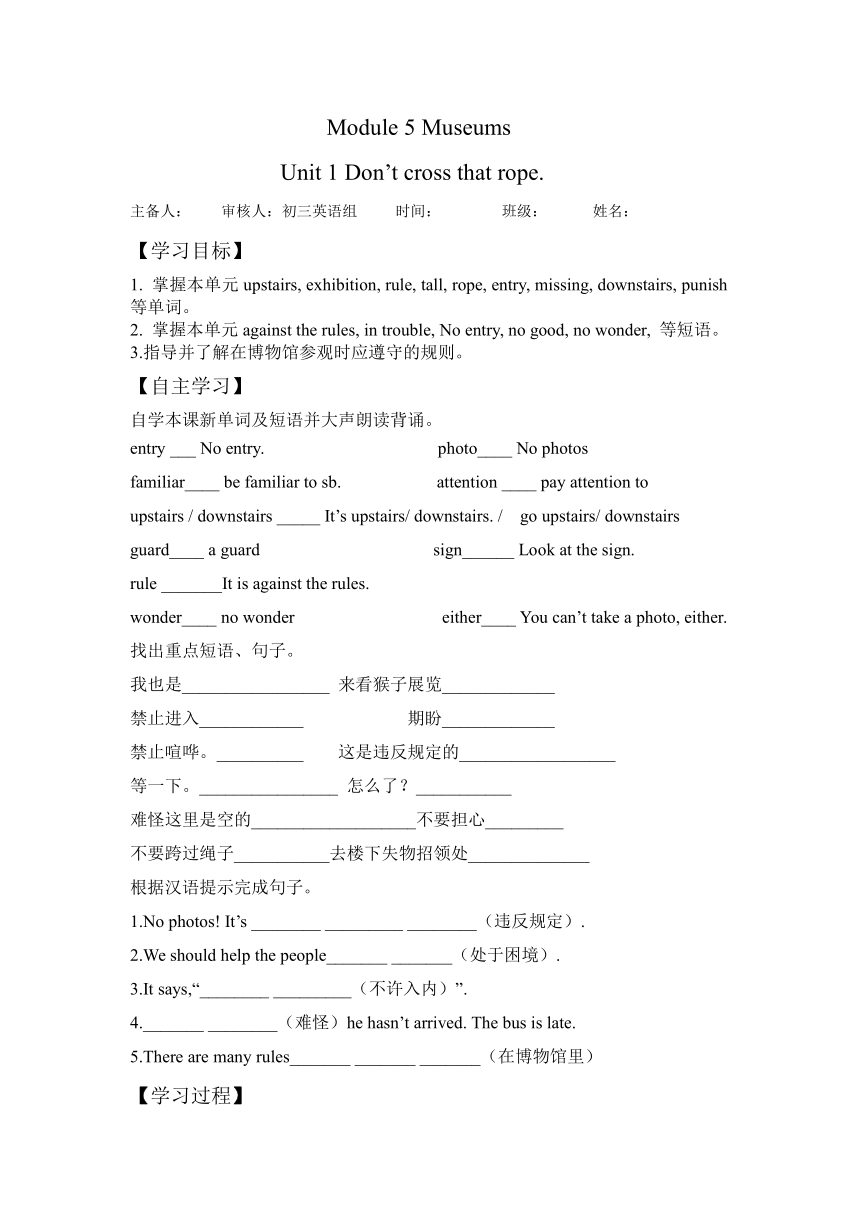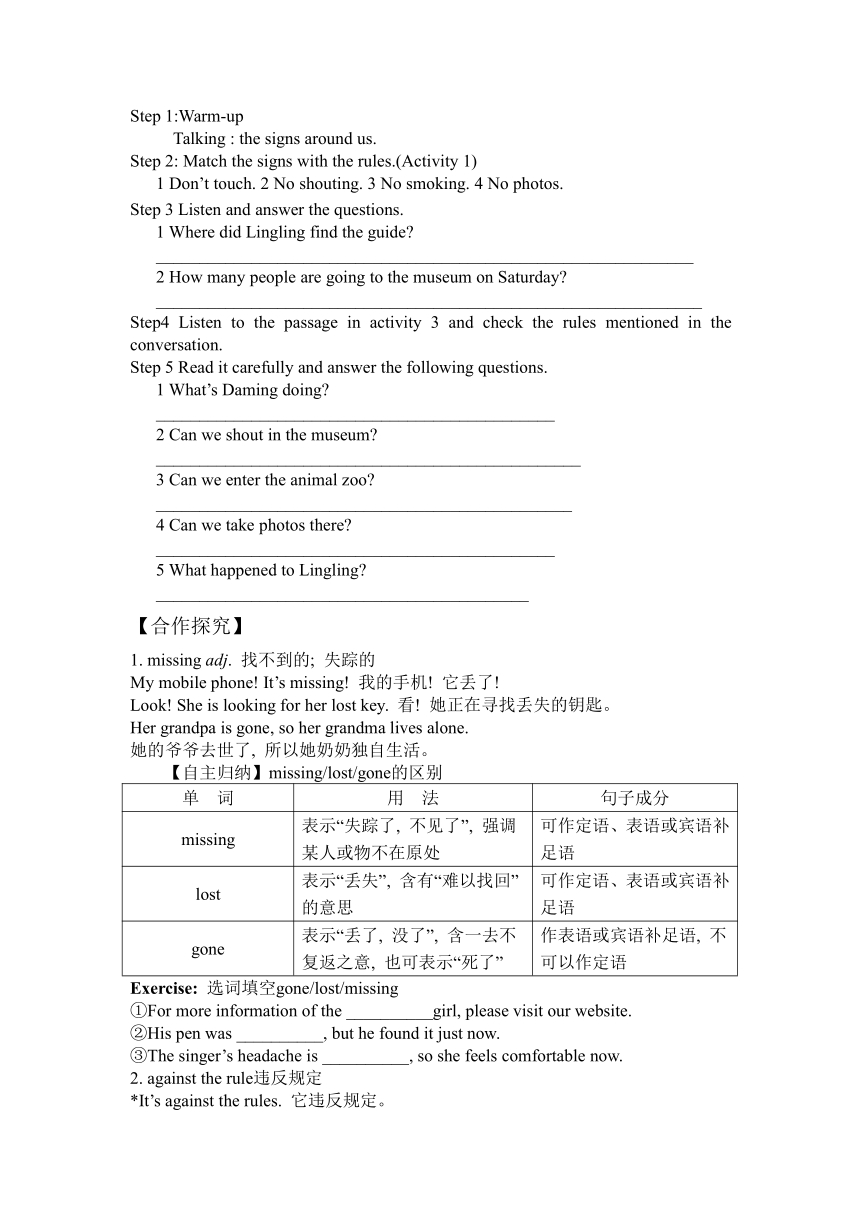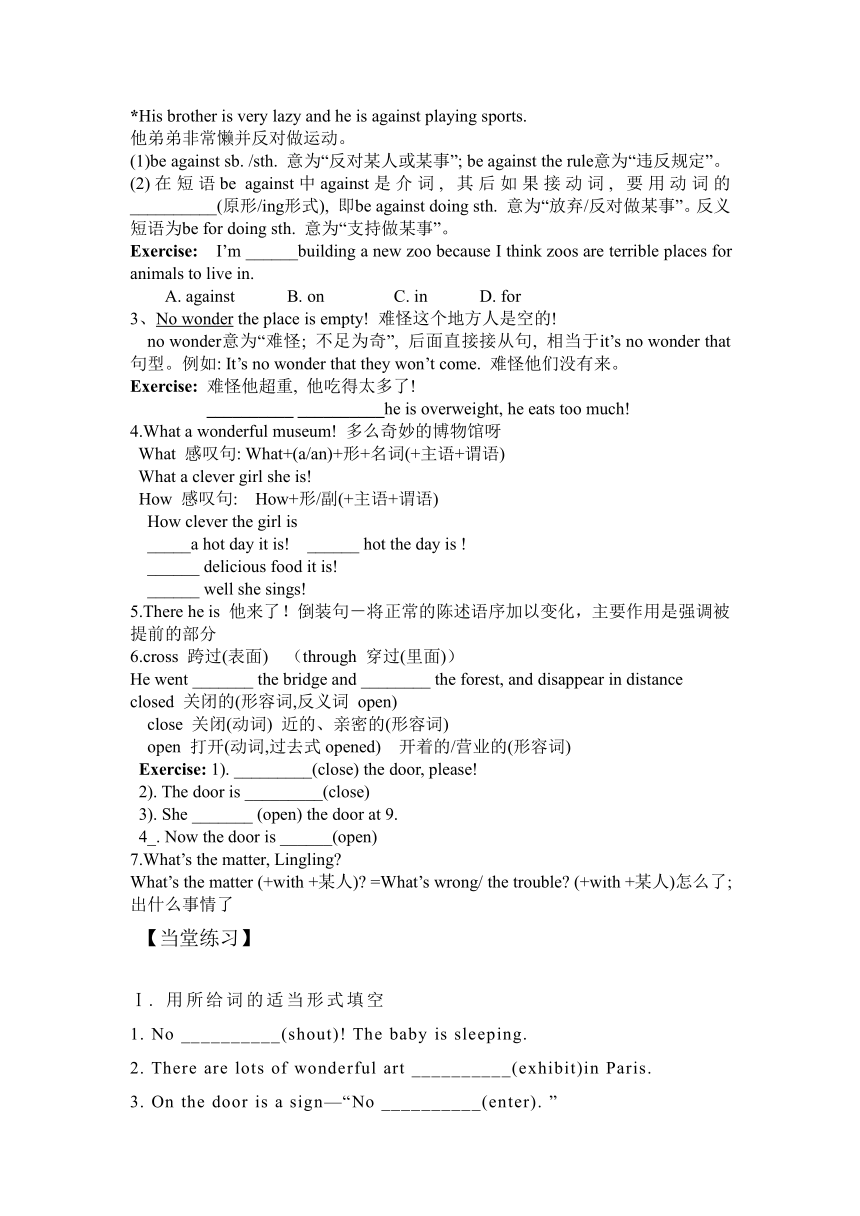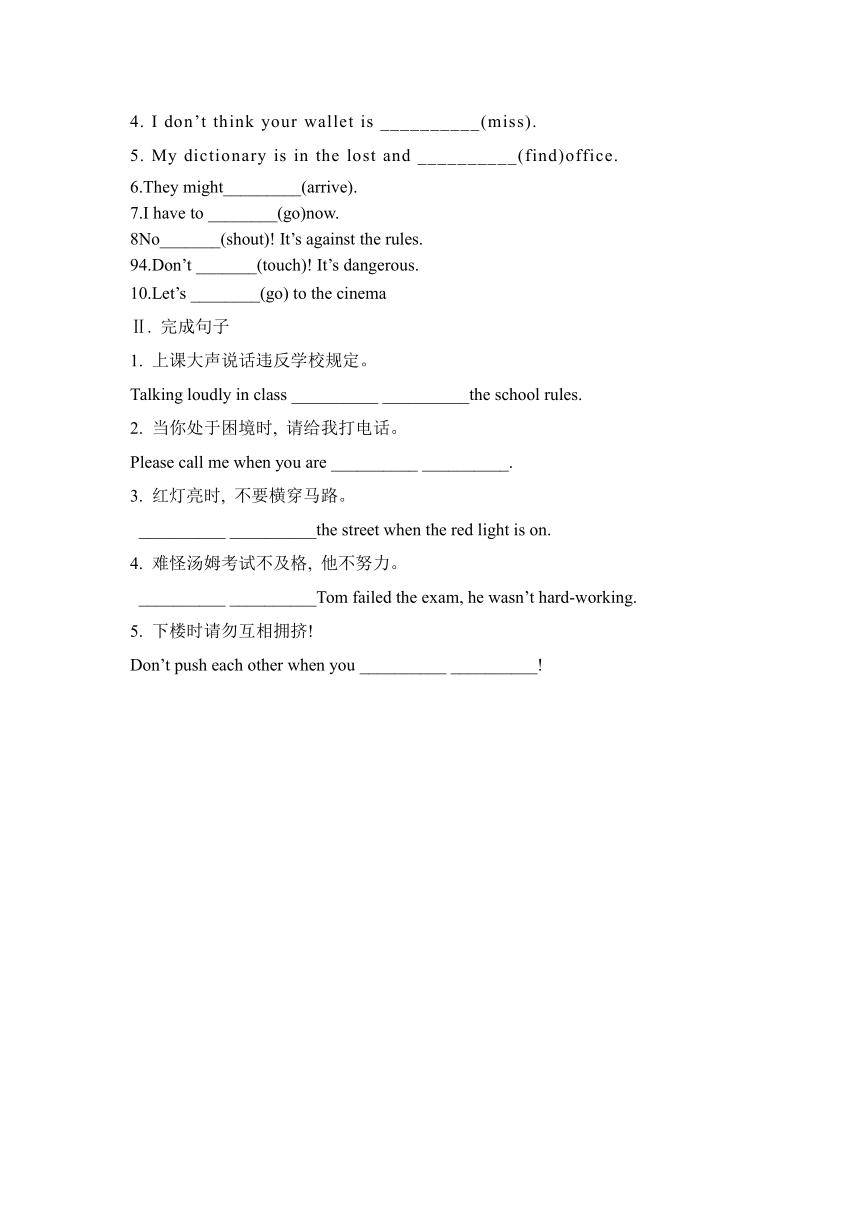外研版九年级上册Module 5 Museums 导学案 (共2课时,无答案)
文档属性
| 名称 | 外研版九年级上册Module 5 Museums 导学案 (共2课时,无答案) |

|
|
| 格式 | docx | ||
| 文件大小 | 33.5KB | ||
| 资源类型 | 教案 | ||
| 版本资源 | 外研版 | ||
| 科目 | 英语 | ||
| 更新时间 | 2024-06-03 19:43:33 | ||
图片预览




文档简介
Module 5 Museums
Unit 1 Don’t cross that rope.
主备人: 审核人:初三英语组 时间: 班级: 姓名:
【学习目标】
1. 掌握本单元upstairs, exhibition, rule, tall, rope, entry, missing, downstairs, punish等单词。
2. 掌握本单元against the rules, in trouble, No entry, no good, no wonder, 等短语。
3.指导并了解在博物馆参观时应遵守的规则。
【自主学习】
自学本课新单词及短语并大声朗读背诵。
entry ___ No entry. photo____ No photos
familiar____ be familiar to sb. attention ____ pay attention to
upstairs / downstairs _____ It’s upstairs/ downstairs. / go upstairs/ downstairs
guard____ a guard sign______ Look at the sign.
rule _______It is against the rules.
wonder____ no wonder either____ You can’t take a photo, either.
找出重点短语、句子。
我也是_________________ 来看猴子展览_____________
禁止进入____________ 期盼_____________
禁止喧哗。__________ 这是违反规定的__________________
等一下。________________ 怎么了?___________
难怪这里是空的___________________不要担心_________
不要跨过绳子___________去楼下失物招领处______________
根据汉语提示完成句子。
No photos! It’s ________ _________ ________(违反规定).
We should help the people_______ _______(处于困境).
It says,“________ _________(不许入内)”.
_______ ________(难怪)he hasn’t arrived. The bus is late.
5.There are many rules_______ _______ _______(在博物馆里)
【学习过程】
Step 1:Warm-up
Talking : the signs around us.
Step 2: Match the signs with the rules.(Activity 1)
1 Don’t touch. 2 No shouting. 3 No smoking. 4 No photos.
Step 3 Listen and answer the questions.
1 Where did Lingling find the guide
______________________________________________________________
2 How many people are going to the museum on Saturday
_______________________________________________________________
Step4 Listen to the passage in activity 3 and check the rules mentioned in the conversation.
Step 5 Read it carefully and answer the following questions.
1 What’s Daming doing
______________________________________________
2 Can we shout in the museum
_________________________________________________
3 Can we enter the animal zoo
________________________________________________
4 Can we take photos there
______________________________________________
5 What happened to Lingling
___________________________________________
【合作探究】
1. missing adj. 找不到的; 失踪的
My mobile phone! It’s missing! 我的手机! 它丢了!
Look! She is looking for her lost key. 看! 她正在寻找丢失的钥匙。
Her grandpa is gone, so her grandma lives alone.
她的爷爷去世了, 所以她奶奶独自生活。
【自主归纳】missing/lost/gone的区别
单 词 用 法 句子成分
missing 表示“失踪了, 不见了”, 强调某人或物不在原处 可作定语、表语或宾语补足语
lost 表示“丢失”, 含有“难以找回”的意思 可作定语、表语或宾语补足语
gone 表示“丢了, 没了”, 含一去不复返之意, 也可表示“死了” 作表语或宾语补足语, 不可以作定语
Exercise: 选词填空gone/lost/missing
①For more information of the __________girl, please visit our website.
②His pen was __________, but he found it just now.
③The singer’s headache is __________, so she feels comfortable now.
2. against the rule违反规定
*It’s against the rules. 它违反规定。
*His brother is very lazy and he is against playing sports.
他弟弟非常懒并反对做运动。
(1)be against sb. /sth. 意为“反对某人或某事”; be against the rule意为“违反规定”。
(2)在短语be against中against是介词, 其后如果接动词, 要用动词的 __________(原形/ing形式), 即be against doing sth. 意为“放弃/反对做某事”。反义短语为be for doing sth. 意为“支持做某事”。
Exercise: I’m ______building a new zoo because I think zoos are terrible places for animals to live in.
A. against B. on C. in D. for
3、No wonder the place is empty! 难怪这个地方人是空的!
no wonder意为“难怪; 不足为奇”, 后面直接接从句, 相当于it’s no wonder that句型。例如: It’s no wonder that they won’t come. 难怪他们没有来。
Exercise: 难怪他超重, 他吃得太多了!
__________ __________he is overweight, he eats too much!
4.What a wonderful museum! 多么奇妙的博物馆呀
What 感叹句: What+(a/an)+形+名词(+主语+谓语)
What a clever girl she is!
How 感叹句: How+形/副(+主语+谓语)
How clever the girl is
_____a hot day it is! ______ hot the day is !
______ delicious food it is!
______ well she sings!
5.There he is 他来了!倒装句-将正常的陈述语序加以变化,主要作用是强调被提前的部分
6.cross 跨过(表面) (through 穿过(里面))
He went _______ the bridge and ________ the forest, and disappear in distance
closed 关闭的(形容词,反义词 open)
close 关闭(动词) 近的、亲密的(形容词)
open 打开(动词,过去式opened) 开着的/营业的(形容词)
Exercise: 1). _________(close) the door, please!
2). The door is _________(close)
3). She _______ (open) the door at 9.
4_. Now the door is ______(open)
7.What’s the matter, Lingling
What’s the matter (+with +某人) =What’s wrong/ the trouble (+with +某人)怎么了;出什么事情了
【当堂练习】
Ⅰ. 用所给词的适当形式填空
1. No __________(shout)! The baby is sleeping.
2. There are lots of wonderful art __________(exhibit)in Paris.
3. On the door is a sign—“No __________(enter). ”
4. I don’t think your wallet is __________(miss).
5. My dictionary is in the lost and __________(find)office.
6.They might_________(arrive).
7.I have to ________(go)now.
8No_______(shout)! It’s against the rules.
94.Don’t _______(touch)! It’s dangerous.
10.Let’s ________(go) to the cinema
Ⅱ. 完成句子
1. 上课大声说话违反学校规定。
Talking loudly in class __________ __________the school rules.
2. 当你处于困境时, 请给我打电话。
Please call me when you are __________ __________.
3. 红灯亮时, 不要横穿马路。
__________ __________the street when the red light is on.
4. 难怪汤姆考试不及格, 他不努力。
__________ __________Tom failed the exam, he wasn’t hard-working.
5. 下楼时请勿互相拥挤!
Don’t push each other when you __________ __________!
Module 5 Museum
Unit 2 If you ever go to London, make sure you visit
the Science Museum.
主备人: 审核人:初三英语组 时间: 班级: 姓名:
【学习目标】
1.知识目标:掌握本单元的重点单词及短语communications, physics, chemistry, dig, coal, energy, experiment, sand, control, truck, wheel, whole.
2.能力目标:能够读懂介绍博物馆的短文,理解公共场所的常用标语;能够描写自己喜爱的博物馆,并正确使用代词it, they, there.
3.情感目标:通过学习,了解英国科学博物馆,并了解世界各类博物馆的异同。
【自主学习】
(一)完成句子和短语。
通信 沙子
物理 轮子
物理实验 挖煤
全部的;整个的 能量
把A和B相比较 控制一辆卡车
所有年龄的 科技博物馆
非常吵闹的机器 了解……
从……挖…… 创造能量
身体内部 很多物理实验
用沙子填满袋子 比较……和……
各年龄段的人们 免费进入
汉语提示完成句子。
If you are not ______ ______(足够快),the lion will catch you.
People _____ _____(谈论)what they can see and do here.
On ______ _______ _______(第三层)is Launchpad.
The Science Museum is interesting for people of_______ ________(各年龄段).
They even explain how people ______ ______(挖煤)from the ground。
【学习过程】
Step 1: Warming-up
Talk about the differences in the two museums
_________________________________________________________________
Step 2 Read the text quickly, and decide which paragraphs describe what you can see in the picture.
Part1 a. What we can see and do in this museum.
Part2 b. Opening hours and the price.
Part3 c. The Science Museum is different from others
Step3 Careful reading
1 、Read Para 1 and find the differences between the Science Museum and most museums.
Most museums
The Science Museum
2、Read Paragraph 2 and fill in the blank.
On the second and third floors
You can learn about You can learn about ________________ and _____________________ as well as maths, physics and chemistry.
For example You can find out ___________________ and ____________________They even explain how X-rays __________________________________.
3、Read Paragraph 3 and fill in the blank.
In the Launchpad (Tony’s favourite)
You can learn about Thereare __________________________. You can also find out how people __________________________________.
For example If you want to ______________________, you have to ____________and ______________________________.
4、 Read Paragraph 4 and fill in the blank.
On the fourth and fifth floors
You can learn about _____________________ in the past.
For example If you compare _____________________ with _____________________________, you will ____________________ next time you visit a doctor!
5、Read Paragraph5 and choose “T” or “F”.
1.The Science Museum is interesting for the young.
2.The museum is free to enter.
3.It is open daily from 10am to 4pm.
【合作探究】
1. whole adj. 全部的; 整个的
*It is my favourite museum in the whole world!
在全世界, 它是我最喜欢的博物馆!
*She spent all her money on books. 她买书花光了所有的钱。
【自主归纳】whole和all的用法辨析
单 词 用法及位置
whole 常用于冠词、物主代词等限定词后, 常修饰具有整体意义的单数可数名词
若复数可数名词前有具体的数量词时, 也可以用whole。例如: three whole days三整天
all 常用于限定词前, 可以修饰各类名词
Exercise: 警察搜查了全城。The police searched the __________ __________.
2. as well 也; 又
*People talk about what they can see and do here, and there are some very noisy machines as well.
人们谈论他们在这里能看到和做到的事情, 也有一些非常喧闹的机器。
*My sister also wants to go to the concert. 我姐姐也想去音乐会。
*He can speak English, I can speak, too. 他会说英语, 我也会说。
*Bill isn’t short, I’m not, either. 比尔不矮, 我也不矮。
单 词 含 义 用 法
as well 也, 同样地 一般位于肯定句句末, 与too两者可以互换, 但as well前不加逗号
also 也, 还 常用在肯定句或疑问句中, 通常位于行为动词前, be动词、助动词或情态动词后
too 也 常用在肯定句句末, 用逗号和前面的句子隔开
either 也 常用在否定句句末, 词前加逗号
Exercise: 选词填空(also/too/either/as well)。
①My parents are __________my friends and helpers.
②I can’t swim, Mary can’t swim, __________.
③Tom is good at math, I am good at math, __________.
④I went shopping yesterday, my English teacher went shopping __________.
3. fill. . . with. . . 把……用……装满
*If you want to fill a bag with sand, you have to control a kind of truck on wheels and move it into the correct place. 如果你想装一袋沙土, 你要控制一种带轮子的运输车, 并把车移动到合适的位置。
*The cup is filled with coffee. 杯子里装满了咖啡。
(1)fill. . . with. . . 为动词短语, 意为“把……用……装满”。主语为人, fill后一般接容器, with后接容器中装的物品。
(2)常用短语be filled with表示“……被……装满”, 表示动作, 其同义短语为be full of, 表示状态。
Exercise: 妈妈, 请帮我倒一玻璃杯牛奶。
Mum, please help me __________a glass __________milk.
4. compare. . . with. . . 比较……与……
*If you compare the medicine of the past with the medicine of today, you will feel very lucky next time you visit a doctor! 如果你比较一下过去的药物与现在的药物, 在下次拜访医生时, 你会感到非常幸运!
*Compare with/to his brother, Jack is smarter. 比起他的弟弟, 杰克更聪明。
*We usually compare the nurses to the white angels.
我们通常把护士比喻成白衣天使。
(1)compare. . . with. . . 意为“把……与……对比”, 强调两者之间比较, 从而发现两者的不同。
(2)compare to/with意为“和……作比较”, 常置于句首。
(3)compare. . . to. . . 意为“把……比作……”或“把……比喻为……”, 说明事物之间有类似或相似之处。
Exercise: 如果你把英式足球与美式足球相比较, 你会发现许多不同之处。
If you __________British football __________American football, you will find many differences.
【当堂练习】Ⅰ. 用所给词的适当形式填空
1. Students must use their dictionaries __________(look)up as many new words as possible.
2. The room is too __________(noise), I can’t read now.
3. The Smiths live in the __________(three)floor of the apartment.
4. Bill’s parents should allow him __________(make)his decision because he is not a child.
5. The Central Park is free __________(visit)on weekends.
Ⅱ. 完成句子
1. (2014·天津和平区期中)她也懂法语。
She knows French __________ __________.
2. 工人们刚刚把沙子装满卡车。
The workers __________the truck __________sand just now.
3. 将这台新电视机与旧电视机一比, 你就会看出哪一台更好一些。
__________this new TV set __________the old one, you will see which is better.
4. 如果你去印度, 一定要品尝一下印度食物。
If you go to India, __________ __________you taste the Indian food.
5. 整栋大楼很快就燃烧起来了。
__________ __________building was soon on fire.
Unit 1 Don’t cross that rope.
主备人: 审核人:初三英语组 时间: 班级: 姓名:
【学习目标】
1. 掌握本单元upstairs, exhibition, rule, tall, rope, entry, missing, downstairs, punish等单词。
2. 掌握本单元against the rules, in trouble, No entry, no good, no wonder, 等短语。
3.指导并了解在博物馆参观时应遵守的规则。
【自主学习】
自学本课新单词及短语并大声朗读背诵。
entry ___ No entry. photo____ No photos
familiar____ be familiar to sb. attention ____ pay attention to
upstairs / downstairs _____ It’s upstairs/ downstairs. / go upstairs/ downstairs
guard____ a guard sign______ Look at the sign.
rule _______It is against the rules.
wonder____ no wonder either____ You can’t take a photo, either.
找出重点短语、句子。
我也是_________________ 来看猴子展览_____________
禁止进入____________ 期盼_____________
禁止喧哗。__________ 这是违反规定的__________________
等一下。________________ 怎么了?___________
难怪这里是空的___________________不要担心_________
不要跨过绳子___________去楼下失物招领处______________
根据汉语提示完成句子。
No photos! It’s ________ _________ ________(违反规定).
We should help the people_______ _______(处于困境).
It says,“________ _________(不许入内)”.
_______ ________(难怪)he hasn’t arrived. The bus is late.
5.There are many rules_______ _______ _______(在博物馆里)
【学习过程】
Step 1:Warm-up
Talking : the signs around us.
Step 2: Match the signs with the rules.(Activity 1)
1 Don’t touch. 2 No shouting. 3 No smoking. 4 No photos.
Step 3 Listen and answer the questions.
1 Where did Lingling find the guide
______________________________________________________________
2 How many people are going to the museum on Saturday
_______________________________________________________________
Step4 Listen to the passage in activity 3 and check the rules mentioned in the conversation.
Step 5 Read it carefully and answer the following questions.
1 What’s Daming doing
______________________________________________
2 Can we shout in the museum
_________________________________________________
3 Can we enter the animal zoo
________________________________________________
4 Can we take photos there
______________________________________________
5 What happened to Lingling
___________________________________________
【合作探究】
1. missing adj. 找不到的; 失踪的
My mobile phone! It’s missing! 我的手机! 它丢了!
Look! She is looking for her lost key. 看! 她正在寻找丢失的钥匙。
Her grandpa is gone, so her grandma lives alone.
她的爷爷去世了, 所以她奶奶独自生活。
【自主归纳】missing/lost/gone的区别
单 词 用 法 句子成分
missing 表示“失踪了, 不见了”, 强调某人或物不在原处 可作定语、表语或宾语补足语
lost 表示“丢失”, 含有“难以找回”的意思 可作定语、表语或宾语补足语
gone 表示“丢了, 没了”, 含一去不复返之意, 也可表示“死了” 作表语或宾语补足语, 不可以作定语
Exercise: 选词填空gone/lost/missing
①For more information of the __________girl, please visit our website.
②His pen was __________, but he found it just now.
③The singer’s headache is __________, so she feels comfortable now.
2. against the rule违反规定
*It’s against the rules. 它违反规定。
*His brother is very lazy and he is against playing sports.
他弟弟非常懒并反对做运动。
(1)be against sb. /sth. 意为“反对某人或某事”; be against the rule意为“违反规定”。
(2)在短语be against中against是介词, 其后如果接动词, 要用动词的 __________(原形/ing形式), 即be against doing sth. 意为“放弃/反对做某事”。反义短语为be for doing sth. 意为“支持做某事”。
Exercise: I’m ______building a new zoo because I think zoos are terrible places for animals to live in.
A. against B. on C. in D. for
3、No wonder the place is empty! 难怪这个地方人是空的!
no wonder意为“难怪; 不足为奇”, 后面直接接从句, 相当于it’s no wonder that句型。例如: It’s no wonder that they won’t come. 难怪他们没有来。
Exercise: 难怪他超重, 他吃得太多了!
__________ __________he is overweight, he eats too much!
4.What a wonderful museum! 多么奇妙的博物馆呀
What 感叹句: What+(a/an)+形+名词(+主语+谓语)
What a clever girl she is!
How 感叹句: How+形/副(+主语+谓语)
How clever the girl is
_____a hot day it is! ______ hot the day is !
______ delicious food it is!
______ well she sings!
5.There he is 他来了!倒装句-将正常的陈述语序加以变化,主要作用是强调被提前的部分
6.cross 跨过(表面) (through 穿过(里面))
He went _______ the bridge and ________ the forest, and disappear in distance
closed 关闭的(形容词,反义词 open)
close 关闭(动词) 近的、亲密的(形容词)
open 打开(动词,过去式opened) 开着的/营业的(形容词)
Exercise: 1). _________(close) the door, please!
2). The door is _________(close)
3). She _______ (open) the door at 9.
4_. Now the door is ______(open)
7.What’s the matter, Lingling
What’s the matter (+with +某人) =What’s wrong/ the trouble (+with +某人)怎么了;出什么事情了
【当堂练习】
Ⅰ. 用所给词的适当形式填空
1. No __________(shout)! The baby is sleeping.
2. There are lots of wonderful art __________(exhibit)in Paris.
3. On the door is a sign—“No __________(enter). ”
4. I don’t think your wallet is __________(miss).
5. My dictionary is in the lost and __________(find)office.
6.They might_________(arrive).
7.I have to ________(go)now.
8No_______(shout)! It’s against the rules.
94.Don’t _______(touch)! It’s dangerous.
10.Let’s ________(go) to the cinema
Ⅱ. 完成句子
1. 上课大声说话违反学校规定。
Talking loudly in class __________ __________the school rules.
2. 当你处于困境时, 请给我打电话。
Please call me when you are __________ __________.
3. 红灯亮时, 不要横穿马路。
__________ __________the street when the red light is on.
4. 难怪汤姆考试不及格, 他不努力。
__________ __________Tom failed the exam, he wasn’t hard-working.
5. 下楼时请勿互相拥挤!
Don’t push each other when you __________ __________!
Module 5 Museum
Unit 2 If you ever go to London, make sure you visit
the Science Museum.
主备人: 审核人:初三英语组 时间: 班级: 姓名:
【学习目标】
1.知识目标:掌握本单元的重点单词及短语communications, physics, chemistry, dig, coal, energy, experiment, sand, control, truck, wheel, whole.
2.能力目标:能够读懂介绍博物馆的短文,理解公共场所的常用标语;能够描写自己喜爱的博物馆,并正确使用代词it, they, there.
3.情感目标:通过学习,了解英国科学博物馆,并了解世界各类博物馆的异同。
【自主学习】
(一)完成句子和短语。
通信 沙子
物理 轮子
物理实验 挖煤
全部的;整个的 能量
把A和B相比较 控制一辆卡车
所有年龄的 科技博物馆
非常吵闹的机器 了解……
从……挖…… 创造能量
身体内部 很多物理实验
用沙子填满袋子 比较……和……
各年龄段的人们 免费进入
汉语提示完成句子。
If you are not ______ ______(足够快),the lion will catch you.
People _____ _____(谈论)what they can see and do here.
On ______ _______ _______(第三层)is Launchpad.
The Science Museum is interesting for people of_______ ________(各年龄段).
They even explain how people ______ ______(挖煤)from the ground。
【学习过程】
Step 1: Warming-up
Talk about the differences in the two museums
_________________________________________________________________
Step 2 Read the text quickly, and decide which paragraphs describe what you can see in the picture.
Part1 a. What we can see and do in this museum.
Part2 b. Opening hours and the price.
Part3 c. The Science Museum is different from others
Step3 Careful reading
1 、Read Para 1 and find the differences between the Science Museum and most museums.
Most museums
The Science Museum
2、Read Paragraph 2 and fill in the blank.
On the second and third floors
You can learn about You can learn about ________________ and _____________________ as well as maths, physics and chemistry.
For example You can find out ___________________ and ____________________They even explain how X-rays __________________________________.
3、Read Paragraph 3 and fill in the blank.
In the Launchpad (Tony’s favourite)
You can learn about Thereare __________________________. You can also find out how people __________________________________.
For example If you want to ______________________, you have to ____________and ______________________________.
4、 Read Paragraph 4 and fill in the blank.
On the fourth and fifth floors
You can learn about _____________________ in the past.
For example If you compare _____________________ with _____________________________, you will ____________________ next time you visit a doctor!
5、Read Paragraph5 and choose “T” or “F”.
1.The Science Museum is interesting for the young.
2.The museum is free to enter.
3.It is open daily from 10am to 4pm.
【合作探究】
1. whole adj. 全部的; 整个的
*It is my favourite museum in the whole world!
在全世界, 它是我最喜欢的博物馆!
*She spent all her money on books. 她买书花光了所有的钱。
【自主归纳】whole和all的用法辨析
单 词 用法及位置
whole 常用于冠词、物主代词等限定词后, 常修饰具有整体意义的单数可数名词
若复数可数名词前有具体的数量词时, 也可以用whole。例如: three whole days三整天
all 常用于限定词前, 可以修饰各类名词
Exercise: 警察搜查了全城。The police searched the __________ __________.
2. as well 也; 又
*People talk about what they can see and do here, and there are some very noisy machines as well.
人们谈论他们在这里能看到和做到的事情, 也有一些非常喧闹的机器。
*My sister also wants to go to the concert. 我姐姐也想去音乐会。
*He can speak English, I can speak, too. 他会说英语, 我也会说。
*Bill isn’t short, I’m not, either. 比尔不矮, 我也不矮。
单 词 含 义 用 法
as well 也, 同样地 一般位于肯定句句末, 与too两者可以互换, 但as well前不加逗号
also 也, 还 常用在肯定句或疑问句中, 通常位于行为动词前, be动词、助动词或情态动词后
too 也 常用在肯定句句末, 用逗号和前面的句子隔开
either 也 常用在否定句句末, 词前加逗号
Exercise: 选词填空(also/too/either/as well)。
①My parents are __________my friends and helpers.
②I can’t swim, Mary can’t swim, __________.
③Tom is good at math, I am good at math, __________.
④I went shopping yesterday, my English teacher went shopping __________.
3. fill. . . with. . . 把……用……装满
*If you want to fill a bag with sand, you have to control a kind of truck on wheels and move it into the correct place. 如果你想装一袋沙土, 你要控制一种带轮子的运输车, 并把车移动到合适的位置。
*The cup is filled with coffee. 杯子里装满了咖啡。
(1)fill. . . with. . . 为动词短语, 意为“把……用……装满”。主语为人, fill后一般接容器, with后接容器中装的物品。
(2)常用短语be filled with表示“……被……装满”, 表示动作, 其同义短语为be full of, 表示状态。
Exercise: 妈妈, 请帮我倒一玻璃杯牛奶。
Mum, please help me __________a glass __________milk.
4. compare. . . with. . . 比较……与……
*If you compare the medicine of the past with the medicine of today, you will feel very lucky next time you visit a doctor! 如果你比较一下过去的药物与现在的药物, 在下次拜访医生时, 你会感到非常幸运!
*Compare with/to his brother, Jack is smarter. 比起他的弟弟, 杰克更聪明。
*We usually compare the nurses to the white angels.
我们通常把护士比喻成白衣天使。
(1)compare. . . with. . . 意为“把……与……对比”, 强调两者之间比较, 从而发现两者的不同。
(2)compare to/with意为“和……作比较”, 常置于句首。
(3)compare. . . to. . . 意为“把……比作……”或“把……比喻为……”, 说明事物之间有类似或相似之处。
Exercise: 如果你把英式足球与美式足球相比较, 你会发现许多不同之处。
If you __________British football __________American football, you will find many differences.
【当堂练习】Ⅰ. 用所给词的适当形式填空
1. Students must use their dictionaries __________(look)up as many new words as possible.
2. The room is too __________(noise), I can’t read now.
3. The Smiths live in the __________(three)floor of the apartment.
4. Bill’s parents should allow him __________(make)his decision because he is not a child.
5. The Central Park is free __________(visit)on weekends.
Ⅱ. 完成句子
1. (2014·天津和平区期中)她也懂法语。
She knows French __________ __________.
2. 工人们刚刚把沙子装满卡车。
The workers __________the truck __________sand just now.
3. 将这台新电视机与旧电视机一比, 你就会看出哪一台更好一些。
__________this new TV set __________the old one, you will see which is better.
4. 如果你去印度, 一定要品尝一下印度食物。
If you go to India, __________ __________you taste the Indian food.
5. 整栋大楼很快就燃烧起来了。
__________ __________building was soon on fire.
同课章节目录
- Module 1 Wonders of the world
- Unit 1 It's more than 2,000 years old.
- Unit 2 The Grand Canyon was not just big.
- Unit 3 Language in use
- Module 2 Public holidays
- Unit 1 My family always go somewhere interesting a
- Unit 2 We have celebrated the festival since the f
- Unit 3 Language in use
- Module 3 Heroes
- Unit 1 She trained hard,so she became a great play
- Unit 2There were few doctors, so he had to work ve
- Unit 3 Language in use
- Module 4 Home alone
- Unit 1 I can look after myself, although it won’t
- Unit 2 I became so bored with their orders that I
- Unit 3 Language in use
- Module 5 Museums
- Unit 1 Don't cross that rope!
- Unit 2 If you ever go to London, make sure you vis
- Unit 3 Language in use
- Module 6 Problems
- Unit 1 If I start after dinner, I'll finish it be
- Unit 2 If you tell him the truth now, you will sho
- Unit 3 Language in use
- Revision Module A
- Module 7 Great books
- Unit 1 We're still influenced by Confucius's idea
- Unit 2 It is still read and loved.
- Unit 3 Language in use
- Module 8 Sports life
- Unit 1 Daming wasn't chosen for the team last time
- Unit 2 He was invited to competitions around the w
- Unit 3 Language in use
- Module 9 Great inventions
- Unit 1 Will computers be used more than books in t
- Unit 2 Will books be replaced by the Internet?
- Unit 3 Language in use
- Module 10 Australia
- Unit 1 I have some photos that I took in Australia
- Unit 2 The game that they like most is Australian
- Unit 3 Language in use
- Module 11 Photos
- Unit 1 He's the boy who won the photo competition
- Unit 2 The photo which we liked best was taken by
- Unit 3 Language in use
- Module 12 Save our world
- Unit 1 If everyone starts to do something, the wor
- Unit 2 Repeat these three words daily: reduce, reu
- Unit 3 Language in use
- Revision Module B
